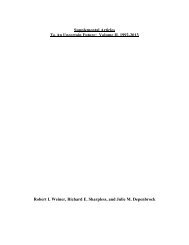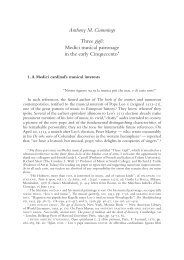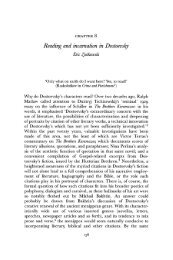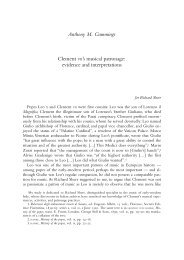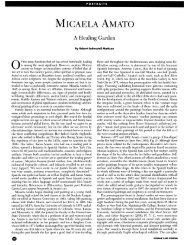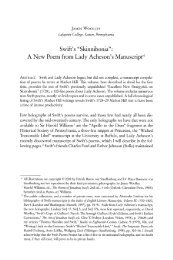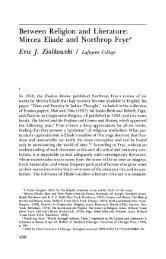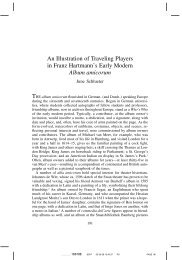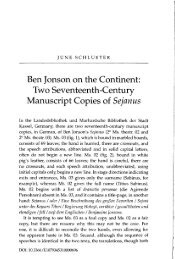courses of instruction - Lafayette College
courses of instruction - Lafayette College
courses of instruction - Lafayette College
Create successful ePaper yourself
Turn your PDF publications into a flip-book with our unique Google optimized e-Paper software.
120. Geological Disasters: Agents <strong>of</strong> Cha<br />
os. Earthquakes, volcanic eruptions, land<br />
slides, hurricanes, floods, tsunamis, and<br />
asteroid impacts are all part <strong>of</strong> the geologic<br />
evolution <strong>of</strong> the earth. For many different<br />
reasons, humans are exposed to the <strong>of</strong>ten<br />
severe consequences <strong>of</strong> living in areas vul<br />
nerable to the violence <strong>of</strong> nature. Through<br />
lecture and laboratory, this course examines<br />
these processes from both scientific and<br />
personal perspectives to understand why<br />
and where they occur and how human ac<br />
tivity has interfered with natural processes,<br />
perhaps making the planet more prone to<br />
disaster. Lecture/laboratory. Preference to<br />
first- and second-year students, geology<br />
majors, and environmental science minors.<br />
Mr. Malinconico<br />
130. Origins, Evolutions, and Extinc<br />
tions. A broad introduction to the origin<br />
and evolution <strong>of</strong> the earth system. The<br />
processes and events that have shaped<br />
earth history, such as the origin and evolu<br />
tion <strong>of</strong> the atmosphere, oceans, continents,<br />
ocean basins, and life are explored. Labo<br />
ratory exercises focus on firsthand study<br />
<strong>of</strong> earth materials that contain evidence<br />
for the processes and events studied in<br />
class and include field trips to local sites.<br />
Preference to first- and second-year stu<br />
dents and geology majors. Lecture/labo<br />
ratory. Ms. Schubel<br />
200. Earth and Planetary Materials. Intro<br />
duction to the crystallographic, structural,<br />
and chemical characteristics <strong>of</strong> rock-form<br />
ing minerals. Consideration <strong>of</strong> the pro<br />
cesses and variables that control mineral<br />
formation. Igneous, metamorphic, hydro-<br />
thermal, and sedimentary environments<br />
in which common minerals form. X-ray<br />
powder diffraction techniques used to<br />
identify earth materials and to determine<br />
unit-cell dimensions, as well as applica<br />
tion <strong>of</strong> this dimensional information. The<br />
laboratory includes discovery-oriented ex<br />
ercises in X-ray diffraction, mineral identi<br />
fication, and crystallography, as well as<br />
high-temperature experiments in phase<br />
equilibria. Lecture/laboratory. Prerequi<br />
sites: Any 100-level geology course and<br />
GEOLOGY AND ENVIRONMENTAL SCIENCES<br />
elementary chemistry, or permission <strong>of</strong><br />
instructor. Mr. Hovis<br />
203. X-Ray Diffraction and Analytical<br />
Techniques. Review <strong>of</strong> crystallography.<br />
Use <strong>of</strong> X-ray powder diffraction tech<br />
niques to identify various materials, both<br />
inorganic and organic, including minerals.<br />
Determination <strong>of</strong> lattice parameters to ob<br />
tain information about atomic structure<br />
and chemical composition. Quantitative<br />
determination <strong>of</strong> mixtures. Determination<br />
<strong>of</strong> errors in X-ray data and consideration<br />
<strong>of</strong> precision versus accuracy. Discussion<br />
and experiments using additional analyti<br />
cal techniques. Requires permission <strong>of</strong> in<br />
structor. Lecture/laboratory. Mr. Hovis<br />
205. Oceanography. Exploration <strong>of</strong> the<br />
physical, chemical, and biological systems<br />
<strong>of</strong> the oceans and human impacts on these<br />
systems. Topics include marine geology,<br />
seawater composition, oceanic and atmo<br />
spheric circulation, waves, tides, coastal<br />
and open ocean processes, marine ecosys<br />
tems, marine resources, and ocean pollu<br />
tion. Lecture/weekend field trips. Week<br />
end field trips explore barrier island envi<br />
ronments and erosion along the New Jer<br />
sey coast; oceanographic sampling tech<br />
niques on Seneca Lake; and marine biolo<br />
gy and pollution <strong>of</strong> the New England<br />
coast. Prerequisite: Any 100-level geology<br />
course or permission <strong>of</strong> instructor. Priority<br />
given to geology majors and first- and sec<br />
ond-year students. Ms. Schubel<br />
210. Hydrogeology. The study <strong>of</strong> ground-<br />
water occurrence, flow, quality, and utiliza<br />
tion. The characteristics <strong>of</strong> the geologic envi<br />
ronment which determines the hydrogeo-<br />
logic system are discussed. Principles <strong>of</strong><br />
groundwater flow, surface water and<br />
groundwater interaction, aquifer response to<br />
pumping, and regional groundwater flow<br />
are examined in detail. The course also fo<br />
cuses on groundwater contamination and<br />
remediation ("clean-up"). Field projects us<br />
ing a well-field at Metzgar Fields and local<br />
remediation sites are utilized to bridge the<br />
gap between theory and practice. Lecture/<br />
laboratory. Prerequisite: Any 100-level geol<br />
ogy course. Mr. Germanoski<br />
123



